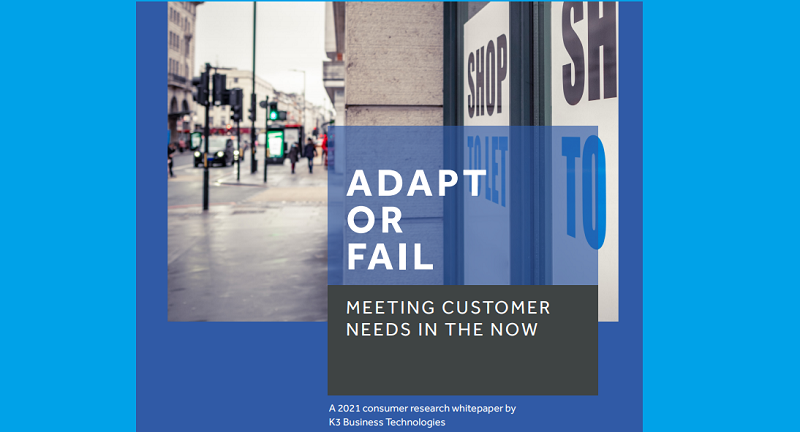
The report from K3 Technologies shows that consumers are also not afraid to act with their wallets.
The report found that retailers risk losing just under half of their customer base if they don’t show their environmental credentials (49%) and a third of consumers (33%) would stop using a retailer for not offering the services they want to see in 2021. In fact, one in ten shoppers would completely avoid a retailer if they didn’t have self-service options.
The report, titled ‘Adapt or fail: meeting customer needs in the now’ draws on research conducted with over 2000 UK shoppers. Other key findings include:
- The two biggest reasons for consumers to avoid shopping with retailers is overcharging for items (43%) and poor customer service (35%). However, under 65s are even more focused on convenience and won’t tolerate anything that interrupts a seamless shopping experience
- Costly deliveries and returns (33%), difficulty in placing orders online (25%), or items being out of stock (24%) are now disincentives that will cause these shoppers to actively avoid a retailer.
- In the last year alone, 30% of customers have boycotted a retailer due to a lack of awareness for the environment. That figure is expected to grow with just under half (49%) ready to abandon retailers who aren’t championing sustainability over the next year
- Retail parks such as Westfield, and high profile destinations like Oxford Street will struggle, with only 17% and 10% respectively expecting to prioritise these locations the next 10 years
- We can expect a resurgence of the local high street, with almost a third (29%) of shoppers expecting to interact most with this type of store over the next 10 years.
Consumers demand a technology-enabled shopping experience
COVID-19 has accelerated a trend towards minimal contact in-store experiences. In fact, one in ten shoppers would completely avoid a retailer if they didn’t have self-service options.
However, this trend is about more than just self-service; customers want to see more innovative technology in the shopping experience. 16% want the introduction of checkout-free stores like Amazon Go and more than one in ten (13%) demand virtual shop assistants to guide them around stores. A further 8% of shoppers’ first preference is for biometric technology like face scanning to unlock a more personalised shopping experience. It’s clear that digitising the in-store experience is key to meeting consumer expectations in the now.
Convenience is king
Convenience still holds the key to consumers’ hearts and wallets. Amazon has raised the bar here; over half (56%) of consumers have used Amazon more since the start of the pandemic, with convenience cited as the main reason.
The research identifies the top frustrations around convenience as price (43%) and poor customer service (35%). However, under 65s are even more focused on convenience and won’t tolerate anything that interrupts a seamless shopping experience. Costly deliveries and returns (33%), difficulty in placing orders online (25%), or items being out of stock (24%) are now disincentives that will cause these shoppers to actively avoid a retailer.
Customers with a conscience
One of the biggest shifts is a move away from mass-consumption and towards sustainability. In the last year alone, 30% of customers have boycotted a retailer due to a lack of awareness for the environment. That figure is expected to grow with just under half (49%) ready to abandon retailers who aren’t championing sustainability over the next year.
Outside of sustainable products and practices, consumers also want to see more ‘circular’ sustainable services:
- Almost half of consumers want retailers to offer more product repairs
- 2 in 5 want more upcycling initiatives (40%)
- 36% want to see second-hand goods being resold
- 20% want to see renting and leasing services offered
Recycling and sustainability should be top of mind for retailers who want to meet the needs of customers in the now.
Moving out of the city
One of the biggest changes facing retailers is a metamorphosis of the modern city. 56% of city dwellers we surveyed are considering moving, with 32% dreaming of somewhere more rural, and 24% considering living abroad.
This will mean stark changes for the industry. Retail parks such as Westfield, and high profile destinations like Oxford Street will struggle, with only 17% and 10% respectively expecting to prioritise these locations the next 10 years. Instead, we can expect a resurgence of the local high street, with almost a third (29%) of shoppers expecting to interact most with this type of store over the next 10 years.
“Retail is an industry constantly in flux. To be successful, retailers need to focus less on an uncertain future and more on meeting the needs of their customers in the now,” said Andy Howell, Global Marketing Director, K3.
“The research shows that shoppers are looking for convenience, digitised experiences and new services. But, underlying all of this is a demand for a smarter, more connected shopping experience. A piecemeal approach will not solve the problem; retailers need to instead create a seamless and innovative shopping experience across all channels. This means bringing all the functionality of online to real-world retail; integrating loyalty, concierge, merchandising and payments into one mobile-based experience. This will also enable a data-driven approach that is key to understanding and meeting customer needs in the now.”
Download the research here
